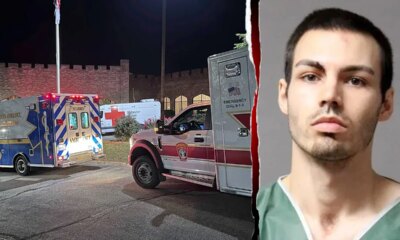Sean Hodgson watched and worried as his best friend of nearly two decades unraveled. His former roommate and fellow US Army reservist’s anger and paranoia were mounting, he had access to guns, and he refused to get help. “I believe he’s going to snap and do a mass shooting,” Hodgson wrote on Sept. 15. Nearly six weeks later, Robert Card fatally shot 18 people at a bowling alley and a bar in Lewiston before killing himself. His body was found in a trailer after a two-day search and regionwide lockdown. “I wasn’t in his head. I don’t know exactly what went on,” Hodgson told the AP last week in an exclusive interview, his first since the Oct. 25 shootings. “But I do know I was right.”
The series of warning signs about Card have been well documented. In May, relatives warned police that Card had grown paranoid, and they expressed concern about his access to guns. In July, Card was hospitalized in a psychiatric unit for two weeks after shoving a fellow reservist and locking himself in a motel room. In August, the Army barred him from handling weapons while on duty and declared him nondeployable. And in September, Hodgson raised the most glaring red flag, telling authorities to change the passcode to the gate at their Army Reserve training facility and arm themselves if Card showed up. “Please,” Hodgson wrote. “I believe he’s messed up in the head.” But authorities declined to confront Card—the clearest example of the missed opportunities to intervene and prevent the deadliest shooting in state history.
That’s hard to swallow for Hodgson, who’s pushing back against an independent report for law enforcement that described Hodgson as “over the top” and “alarmist.” “I did my job, and I went over and beyond it, and I literally spelled it out for them,” said Hodgson, 43, referred to by only his last name in documents related to the case. “I don’t know how clear I could have gotten.” Hodgson’s account, taken together with law enforcement documents, videos, and other interviews, provides the most comprehensive picture to date of potential missteps leading up to the shooting. In replying to the AP’s questions about the investigation and Hodgson’s warning, the Army Reserve said in a statement this week that no one should jump to conclusions until its own investigation and an independent probe by the Army inspector general are finalized.
story continues below
“Any speculation at this point without having all the details could affect the outcome of the investigation. More details may become available once the investigation is complete,” Army Reserve spokesperson Lt. Col. Addie Leonhardt said in the statement. Officials wouldn’t comment further. More than two months later, Hodgson said, he hates that Card “took the easy way out” and isn’t around to answer questions or face the consequences of what he did. It’s not the Robert Card he knew and loved for 17 years, he said, and he struggles with that every day. “I don’t know how to express to people how much I loved him, how much I cared about him,” he said. “And how much I hate what he did.” Much more here. (Read more Maine mass shooting stories.)











































